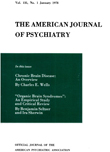How They Grow Up: 41 Physically Handicapped Children and Their Families
Abstract
The authors followed 41 physically handicapped children through their first few years in school, examining the developmental process in the life of such children. They found that most of the children underwent two well-defined crises related to specific developmental hurdles between the ages of five and nine. Many of their parents could not initially deal realistically with the problem of the child's future, but with help they were able to do so later. The authors discuss their findings in the light of various developmental theories.
Access content
To read the fulltext, please use one of the options below to sign in or purchase access.- Personal login
- Institutional Login
- Sign in via OpenAthens
- Register for access
-
Please login/register if you wish to pair your device and check access availability.
Not a subscriber?
PsychiatryOnline subscription options offer access to the DSM-5 library, books, journals, CME, and patient resources. This all-in-one virtual library provides psychiatrists and mental health professionals with key resources for diagnosis, treatment, research, and professional development.
Need more help? PsychiatryOnline Customer Service may be reached by emailing [email protected] or by calling 800-368-5777 (in the U.S.) or 703-907-7322 (outside the U.S.).



